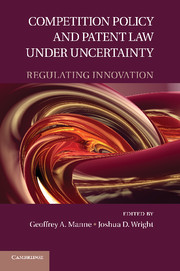Book contents
- Frontmatter
- Contents
- Contributors
- Introduction
- PART I THE INSTITUTIONS OF GROWTH
- PART II THE ECONOMICS OF INNOVATION
- PART III INNOVATION AND COMPETITION POLICY
- PART IV THE PATENT SYSTEM
- PART V PROPERTY RIGHTS AND THE THEORY OF PATENT LAW
- 12 Commercializing Property Rights in Inventions
- 13 The Modularity of Patent Law
- 14 Removing Property from Intellectual Property and (Intended?) Pernicious Impacts on Innovation and Competition
- PART VI INTELLECTUAL PROPRETY AND ANTITRUST: THE REGULATION OF STANDARD-SETTING ORGANIZATIONS
- Index
- References
14 - Removing Property from Intellectual Property and (Intended?) Pernicious Impacts on Innovation and Competition
Published online by Cambridge University Press: 05 June 2012
- Frontmatter
- Contents
- Contributors
- Introduction
- PART I THE INSTITUTIONS OF GROWTH
- PART II THE ECONOMICS OF INNOVATION
- PART III INNOVATION AND COMPETITION POLICY
- PART IV THE PATENT SYSTEM
- PART V PROPERTY RIGHTS AND THE THEORY OF PATENT LAW
- 12 Commercializing Property Rights in Inventions
- 13 The Modularity of Patent Law
- 14 Removing Property from Intellectual Property and (Intended?) Pernicious Impacts on Innovation and Competition
- PART VI INTELLECTUAL PROPRETY AND ANTITRUST: THE REGULATION OF STANDARD-SETTING ORGANIZATIONS
- Index
- References
Summary
Commentators have poured forth a loud and sustained outcry over the past few years that sees property rule treatment of intellectual property (IP) causing excessive transaction costs, thickets, anticommons, holdups, holdouts, and trolls unduly taxing and retarding innovation, competition, and economic growth. The popular response has been to seek a legislative shift toward some limited use of weaker, liability rule treatment, usually portrayed as “just enough” to facilitate transactions in those special cases where the bargaining problems are at their worst and where escape hatches are most needed. This chapter is designed to make two contributions. First, it shows how, through a set of changes in case law over just the past few years, the patent system has been hugely re-shaped from a system having several major, and helpful, liability-rule-pressure-release-valves into a system that is fast becoming almost devoid of significant property rule characteristics, at least for those small entities that would most need property rule protection. The chapter then explores some harmful effects of this shift, focusing on the ways liability rule treatment can seriously impede the beneficial deal-making mechanisms that facilitate innovation and competition. The basic intuition behind this bad effect of liability rules is that they seriously frustrate the ability for a market-challenging patentee to attract and hold the constructive attention of a potential contracting party (especially one that is a larger, more established party) while preserving the option to terminate the negotiations in favor of striking a deal with a different party.
- Type
- Chapter
- Information
- Competition Policy and Patent Law under UncertaintyRegulating Innovation, pp. 416 - 440Publisher: Cambridge University PressPrint publication year: 2011
References
- 2
- Cited by



